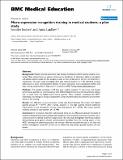Micro-expression recognition training in medical students: a pilot study
Abstract
Background: Patients provide emotional cues during consultations which may be verbal or non-verbal. Many studies focus on patient verbal cues as predictors of physicians' ability to recognize and address patient needs but this project focused on non-verbal cues in the form of facial micro-expressions. This pilot study investigated first year medical students' (n = 75) identified as being either good or poor communicators abilities to detect emotional micro-expressions before and after training using the Micro Expression Training Tool (METT) http://www.mettonline.com. Methods: The sample consisted of 24 first year medical students, 9 were from the lowest performance quartile in a communication skills OS CE (Objective Structured Clinical Exam) station and 15 were from the highest performance quartile. These students completed the METT individually, recording pre- and post-assessment scores. Students were also invited to provide their views on the training. Results: No difference in pre-assessment scores was found between the lowest and highest quartile groups (P = 0.797). Af ter training, students in the high quartile showed significant improvement in the recognition of facial micro-expressions (P = 0.014). The lowest quartile students showed no improvement (P = 0.799). Conclusion: In conclusion, this pilot study showed there was no difference between the ability of medical undergraduate students assessed as being good communicators and those assessed as poor communicators to identify facial micro-expressions. But, the study did highlight that those students demonstrating good general clinical communication benefited from the training aspect of the METT, whereas low performing students did not gain. Why this should be the case is not clear and further investigation should be carried out to determine why lowest quartile students did not benefit.
Citation
Endres , J & Laidlaw , A H 2009 , ' Micro-expression recognition training in medical students: a pilot study ' , BMC Medical Education , vol. 9 , no. 47 , 47 . https://doi.org/10.1186/1472-6920-9-47
Publication
BMC Medical Education
Status
Peer reviewed
Type
Journal article
Collections
Items in the St Andrews Research Repository are protected by copyright, with all rights reserved, unless otherwise indicated.

